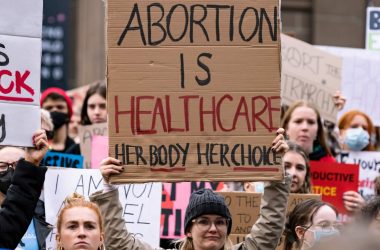Setting a dangerous precedent, nation’s highest court allows bosses to discriminate against employees’ health care coverage based solely on personal, religious views
Washington, DC–(ENEWSPF)–June 30, 2014. In a 5-to-4 ruling, the U.S. Supreme Court issued a ruling today allowing private companies to deny their employees insurance coverage for birth control under the Affordable Care Act’s preventive health provisions designed to greatly expand affordable health care services for all women in the U.S.
Today’s decision holds that the U.S. Department of Health and Human Services’ requirement that employers cover all FDA-approved forms of contraception violates the Religious Freedom Restoration Act of 1993 (RFRA) because, according to Justice Samuel Alito’s majority opinion, the requirement violates “the sincerely held religious beliefs of the companies’ owners.”
In a dissent that flatly refutes the majority’s reading of RFRA as “not plausible” and questions whether the precedent set in the decision can really be confined to either the issue of contraceptive coverage or specific contraceptives cited in Hobby Lobby and Conestoga Wood’s complaints, Justice Ruth Bader Ginsburg wrote, “I fear the Court has ventured into a minefield by its immoderate reading of RFRA.”
Justice Ginsburg spells out the direct harm that this decision will cause women. As she notes, “the cost of an IUD is nearly equivalent to a month’s full-time pay for workers earning the minimum wage,” and “almost one-third of women would change their contraceptive method if costs were not a factor.”
Ginsburg notes that the owners of Hobby Lobby “and all who share their beliefs may decline to acquire for themselves the contraceptives in question. But that choice may not be imposed on employees who hold other beliefs. Working for Hobby Lobby or Conestoga, in other words, should not deprive employees of the preventive care available to workers at the shop next door.”
Said Nancy Northup, President and CEO of the Center for Reproductive Rights:
“This astonishingly backward-looking decision makes one troubling pronouncement after another, turning back the clock on what should have been an historic measure of progress for women’s health and empowerment.
“The court has given bosses the power to dictate how their employees can and cannot use their health insurance—allowing them to intrude into their employees’ private decisions based on whatever personal beliefs their employers happen to hold.
“Especially disturbing is the majority’s acceptance of the business owners’ objection to certain common forms of contraception based on the patently false characterization that they are tantamount to abortion. This decision gives employers license to withhold insurance benefits for safe, effective contraceptive methods, such as IUDs, based on unscientific beliefs.
“The facts are clear: 99 percent of women will rely on contraception in their lives to avoid unintended pregnancy and plan their families and future. This promotes the health and well-being of millions of women and their families, and our society as a whole.
“We now look to Congress and the Obama administration to act swiftly to ensure that only women, not their bosses, have the authority to decide what health care choices are appropriate for them and their families. “
The cases decided today, Burwell v. Hobby Lobby Stores, Inc., and Conestoga Wood Specialties Corp. v. Burwell, are two of more than 40 similar lawsuits that have been filed by for-profit, private companies in courts across the country.
The Affordable Care Act—which was signed into law more than three years ago and upheld in 2012 by the U.S. Supreme Court—vastly expands women’s access to preventive health care without copayments, including contraception, cancer screenings, HIV and STI testing, well-woman visits, breastfeeding support, and prenatal and post-partum care and counseling. After decades of inconsistent and often discriminatory coverage of contraception by insurance plans, the health care law requires all insurance policies to cover birth control with no out-of-pocket cost to women.
According to respected medical authorities—including the National Institutes of Health, the Mayo Clinic, and the International Federation of Gynecology and Obstetrics—emergency contraception prevents unintended pregnancies by delaying or preventing ovulation. It does not cause or induce abortion.
Intrauterine devices (IUDs) are a form of safe, effective long-acting reversible contraception that is more than 99 percent effective in preventing pregnancy. Some IUDs can also be used as an effective form of emergency contraception when inserted within five days of unprotected sex.
Ninty-nine percent of all sexually active women in the U.S. use birth control at some point during their reproductive years. The Affordable Care Act’s expanded coverage for contraception vastly increases the accessibility of birth control for women who need it, especially those interested in using long-acting reversible contraception like IUDs, which often had a high upfront cost and co-pay.
The Center for Reproductive Rights, along with co-counsel Morrison & Foerster and Prof. Noah Novogrodsky of the University of Wyoming School of Law, filed an amicus brief on behalf of professors specializing in international and foreign law with the U.S. Supreme Court arguing that in a global context, women’s access to affordable contraception has been consistently recognized as key to furthering a woman’s liberty, dignity, and equality. And in balancing those rights against the right to conscientious objection in the health care context, the world community gives priority to women’s right to access health care and limits any objection right to those who are directly involved in providing the medical service at issue.
Furthermore, the United States has rightfully cited the benefits of the Affordable Care Act as evidence of the nation’s compliance with its human rights treaty obligations and other global agreements on sustainable development. The brief also demonstrated that courts and statutes around the globe have recognized that individual religious or conscience rights only apply to those directly providing care, and not to institutions or businesses.
Source: http://reproductiverights.org
Related Articles:
Statement by NARAL Pro-Choice America Reaction to the Supreme Court Decision On Hobby Lobby
Supreme Court Allows Employers to Discriminate Against Employees by Denying Contraception Coverage








